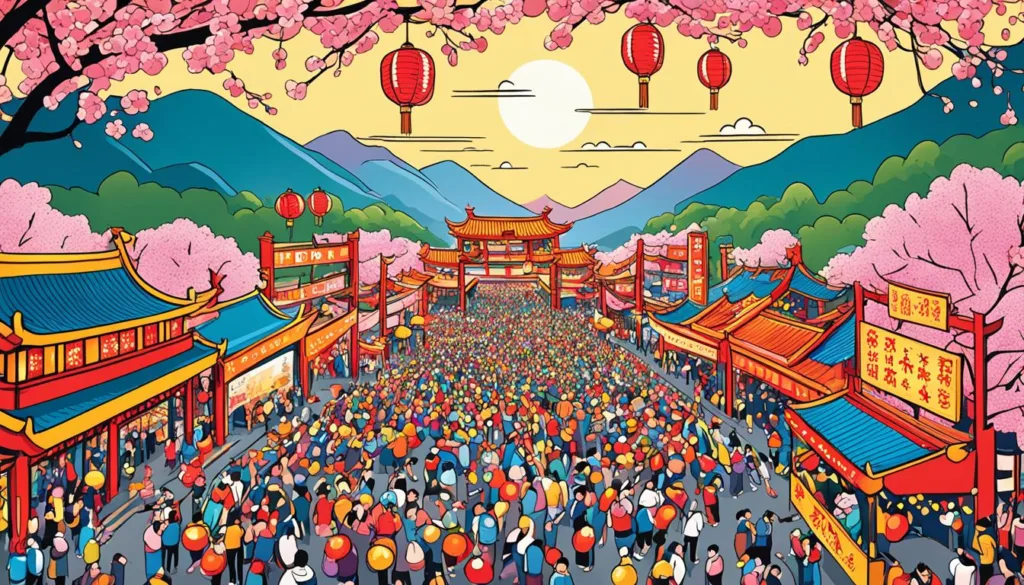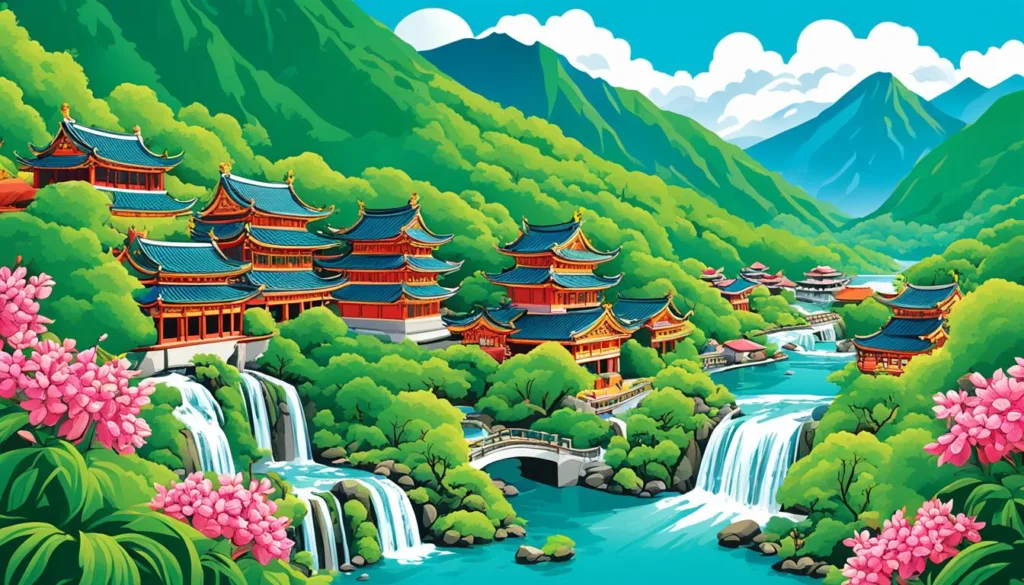Imagine an island where the thrum of lively markets harmonizes with the tranquility of breathtaking sceneries—a place that palpates with the heartbeat of urban festivity yet whispers through its serene natural landscapes. This is Taiwan, a destination that organically blends cultural exuberance with the sublime beauty of nature. But when is the best time to visit Taiwan to immerse yourself fully in its quintessential experiences—from savoring street food in bustling night markets to embracing the tranquility of its rolling hills? Navigate through this Taiwan destination guide and unearth crucial Taiwan travel tips that ensure your journey encompasses the vibrant best of what the island has to offer.
Key Takeaways
- Discover why certain months are the prime best time to visit Taiwan for a vibrant travel experience.
- Learn about the unique characteristics of Taiwan’s night markets and why timing is everything.
- Essential Taiwan travel tips for planning your trip to align with cultural festivities and ideal weather.
- A guide to Taipei’s most celebrated night markets and the delicacies that define them.
- Insights into the natural attractions and the optimal seasons to visit for a nature-culture symphony.
Unveiling the Vibrancy of Taiwan’s Night Markets
As dusk falls over Taiwan, the island pulses with a vibrant rhythm that can be best experienced through its famous night markets. An integral piece of Taiwan travel planning includes delving into this enchanting world where food, culture, and commerce dance together nightly. Visitors will find Taipei’s markets to be among the top attractions in Taiwan, with unique flavors and bustling atmospheres that make for an unforgettable journey.
Experience the Bustling Scenes of Taipei’s Local Favorites
Within the capital city, travelers can embark on a sensory overload as they wander through the neon-lit alleys of Shilin, Rahoe Street, and Ningxia Night Markets. These spots are not just markets but social experiences that showcase the heart of Taiwanese life.
A Gourmet’s Guide to Night Market Delicacies
Taiwanese night markets are a foodie’s paradise, offering a plethora of delicacies that promise to delight one’s palate. Stinky tofu, despite its pungent aroma, is a beloved local specialty, while the oyster omelette combines the ocean’s freshness with the comfort of a home-cooked meal.
Exploring Street Foods and Hidden Gems Beyond the Capital
The adventure continues beyond Taipei, as each region adds its twist to the night market scene. The Liuhe Market in Kaohsiung and Luodong Market in Yilan County are treasure troves for discovering local treats and regional culinary craftsmanship.
| Taipei Market | Specialty | Location |
|---|---|---|
| Shilin Night Market | Giant Fried Chicken Steak | Shilin District |
| Rahoe Street Night Market | Taiwanese Sausage with Sticky Rice | Songshan District |
| Ningxia Night Market | Mochi and Taiwanese Meatballs | Datong District |
The array of markets across Taiwan offers endless exploration. For the best experience, align your travel planning with the ideal months in Taiwan to ensure pleasant weather as you immerse yourself in the night market culture.
Best Time to Visit Taiwan
The allure of Taiwan’s natural landscapes and the vibrant night markets beckons travelers from around the globe. For those embarking on travel planning for Taiwan, deciphering Taiwan weather seasons is essential to maximizing the pleasure of your journey. A pivotal aspect of any Taiwan destination guide is to recognize that spring (March to May) and autumn (September to November) emerge as the most favorable times to visit this island nation. During these months, the weather strikes a desirable balance, being neither excessively hot nor prone to the heavy downpours of the monsoon season.

In spring, the countryside bursts with shades of green and flowers bloom in abundance, making it perfect for those who wish to experience Taiwan’s outdoor splendor. Similarly, fall offers crisp air and scant rainfall, creating an idyllic backdrop for cultural exploration and evening strolls through bustling markets. To refine your itineraries further, consider the detailed breakdown below:
| Season | Weather | Cultural Festivities | Travel Recommendations |
|---|---|---|---|
| Spring (March-May) | Mild temperatures, occasional rain showers | Cherry blossom festivals, Kite flying events | Nature walks, Food sampling in night markets |
| Summer (June-August) | Hot and humid, frequent downpours | Dragon Boat Festival, Ghost Month | Indoor activities, Visiting museums |
| Fall (September-November) | Cool, dry weather | Moon Festival, Taiwan Cycling Festival | Cycling excursions, Rooftop bar hopping |
| Winter (December-February) | Relatively mild, less crowded attractions | Lunar New Year, Hot spring season | Cultural celebrations, Hot spring visits |
By aligning your travel planning for Taiwan with this knowledge of Taiwan weather seasons, you stand to immerse yourself fully in the tapestry of experiences this destination has to offer. From the warmth of spring’s promise to the contemplative coolness of fall, each season in Taiwan unfolds with its distinct characteristics and offerings, crafting immaculate memories for savvy travelers.
Taiwan Weather Seasons and Optimal Travel Planning
Understanding the varied climate zones of Taiwan is fundamental for anyone looking to explore this beautiful island. Whether you are visiting the bustling streets of Taipei in the north or the balmy coastal areas of Kaohsiung in the south, appreciating the differences in Taiwan weather seasons can enhance your travel experience significantly. With an island so rich in diversity, the Taiwan travel tips you gather prior to your journey are invaluable, letting you discover Taiwan at its best during the ideal months in Taiwan.
Understanding Taiwan’s Climate for Ideal Travel
Taiwan’s spectrum of climates means that while one region is enjoying sun-soaked days, another might be under a cool spell. The north, with its humid subtropical climate, offers warm summers and mild winters, making it a year-round destination. In contrast, the southern tropical climate of Kaohsiung treats visitors to warmer temperatures across all seasons. For those seeking the most comfortable travel conditions, the spring and fall months are typically heralded as the ideal months in Taiwan due to their pleasant temperatures and lesser rainfall.
Preparation Tips for Taiwan’s Varied Weather Patterns
Being equipped for Taiwan’s weather is part of smart travel planning. Here are some tips to keep in mind:
- No matter when you visit, carry an umbrella as showers can be sudden and frequent, especially in the north.
- Summer months can be hot and humid; wear light, breathable clothing if you’re traveling during this season.
- Winter in the north can be cool, so packing layers is advisable if visiting from December to February.
- Weather can influence the vibrancy of local festivals, so check the calendar for events that might coincide with ideal weather periods.
Remember, Taiwan’s diverse weather patterns are part of its charm, creating a unique experience in every season for travelers. By arming yourself with these Taiwan travel tips, and understanding the Taiwan weather seasons, you’re all set to enjoy the many wonders this island has to offer.
Cultural Celebrations: Festivities and Events Around the Island
Taiwan is a land of vibrant traditions and seasonal celebrations, marking the cultural richness that engulfs this beautiful destination. As you embark on Taiwan travel planning, it is essential to note that the island’s cultural events are not only spectacles of color and heritage but also influential in the rhythm of Taiwan’s night markets, often revered as the pinnacle of Taiwan’s nightlife. Understanding these festivities is crucial, especially during the peak season in Taiwan, as they can significantly enrich your travel experience.
Traditional Festivals and Their Impact on Night Market Timings
The traditional festivals of Taiwan serve as a heartbeat for the night markets, aligning special market schedules with cultural rituals. During the Lunar New Year period, the Dihua Street market transforms into a bustling epicenter of festive trades, offering auspicious items and traditional snacks. Similarly, the celebrated Mid-Autumn Festival affects the markets’ timings, with mooncakes and barbecue stalls staying open late into the night to accommodate family reunions.
As part of our Taiwan destination guide, it is pivotal to note that these adjusted timings present a unique opportunity for visitors to immerse themselves in the heightened spirit of these celebrations. Locals and tourists alike can savor season-specific delicacies and engage in festivities, creating memories amidst a fusion of aromas and laughter.
Annual Events and the Best Times to Witness Taiwan’s Heritage
The fabric of Taiwanese culture is interwoven with its annual events that spotlight the island’s diverse heritage. For instance, attending the Dragon Boat Festival allows you to witness exhilarating boat races followed by tasting zongzi at nearby markets. Additionally, the Indigenous Harvest Festival in Hualien showcases traditional costumes and performances, influencing market offerings with indigenous crafts and flavors. These events provide a deep dive into the depths of Taiwan’s legacy, proving invaluable to any Taiwan travel planning process.
Tourists are fortunate to experience these events as they capture the essence of Taiwan’s ancestral diversity, amplifying the country’s rich narrative through various expressions.
Remember that the peak season in Taiwan also coincides with several of these cultural spectacles, so planning ahead can help you avoid the crowds while still partaking in these momentous occasions. To ensure that you fully embrace the spirit of Taiwan, aligning your visit with these festivals is advised.

By timing your visit to coincide with these lively festivities, you will leave with more than just souvenirs. Each festival provides a view into the soul of the island, making every night market visit an experience steeped in tradition and communal joy, embodying the true rhythm of Taiwan.
Exploring Natural Wonders: When Nature Meets Culture
Taiwan is not just a destination for urban explorers and night market aficionados; it’s a treasure trove of natural landscapes waiting to be discovered. For travelers making their travel planning for Taiwan, the island offers an enchanting blend of natural beauty in Taiwan and cultural richness. The layering of seasons across the island translates into a diverse range of natural attractions, each with its peak moment, providing an ever-changing backdrop for adventure and exploration.
Seasonal Natural Attractions of Taiwan
Seasonality is key when seeking the top attractions in Taiwan. Different times of the year showcase various aspects of Taiwan’s natural charm. As the spring blossoms begin to bloom, the country’s lush forestry and vibrant wildflowers make places like Yangmingshan National Park a visual delight. During autumn, the leaves turn to warm, earthy hues, providing a scenic panorama at the Sun Moon Lake. Winter, while mild, offers the unique hot springs experience in Beitou, and summer boasts sun-soaked days perfect for visiting the stunning beaches of Kenting.

Outdoor Activities and Taiwan’s Natural Parks
The heart of Taiwan’s allure for many travelers lies in its natural parks and the array of outdoor activities they offer. Whether you’re hiking the trails of Taroko Gorge, cycling around the East Rift Valley, or watching birds in the wetlands of Tainan, there’s something to match every nature enthusiast’s desires. Taroko National Park, renowned for its marble-walled canyon, is a must-visit for trekkers and photographers alike. Meanwhile, adrenaline seekers may flock to Hualien for paragliding over the Pacific.
| Season | Attraction | Activity | Location |
|---|---|---|---|
| Spring | Cherry Blossoms | Flower viewing | Yangmingshan National Park |
| Summer | Beaches | Surfing, Snorkeling | Kenting National Park |
| Autumn | Maple Leaves | Hiking, Photography | Alishan National Scenic Area |
| Winter | Hot Springs | Spa and Relaxation | Beitou |
Integrating Taiwan’s natural beauty with its cultural offerings provides a holistic travel experience. Exploring these wonders, while planning to admire the urban culture of night markets, ensures a well-rounded journey. Each encounter with Taiwan’s natural wonders not only complements the vibrant market culture but enriches it, highlighting Taiwan’s unique capacity to meld the allure of nature with the charm of its traditional and contemporary customs.
Taiwan Travel Tips for a Seamless Adventure
As you embark on your journey to Taiwan, a few smart travel planning strategies can transform your experience from enjoyable to extraordinary. For the intrepid traveler, a reliable Taiwan destination guide becomes an indispensable ally. Familiarize yourself with Taiwan’s efficient rail and bus networks, as they are your golden tickets to the island’s scenic outskirts and hidden local jewels. Tapping into the rhythm of the region means knowing the best times to dive into the hum of night markets at their peak, while also being privy to the seasonal shifts in weather that could affect your daily adventures.
Traveling during off-peak seasons not only allows for more leisurely exploration of Taiwan’s landscapes and cultural sites, it often results in a more authentic connection with the local life—a perk for those keen on cultural immersion. Whether you’re savoring the bold flavors of a night market’s signature dish or participating in the vibrant customs during one of Taiwan’s traditional festivals, each decision you make shapes your travel narrative. Managing these finer details in your itinerary by harnessing insightful Taiwan travel tips will smooth out the edges of your travel plans, ensuring a seamless blend of cultural engagement and personal discovery.
From the serenity of mountaintop temples to the bustling lanes of a night market, balancing comfortable sightseeing with spontaneous excursions is the essence of savvy travel planning for Taiwan. By integrating these practical pointers into your travel agenda, your Taiwanese escapade will evolve into a splendid tapestry of memories, marked by a harmony of nature’s wonders and the rich tapestry of local heritage—an adventure in this island nation that you’ll remember for years to come.






